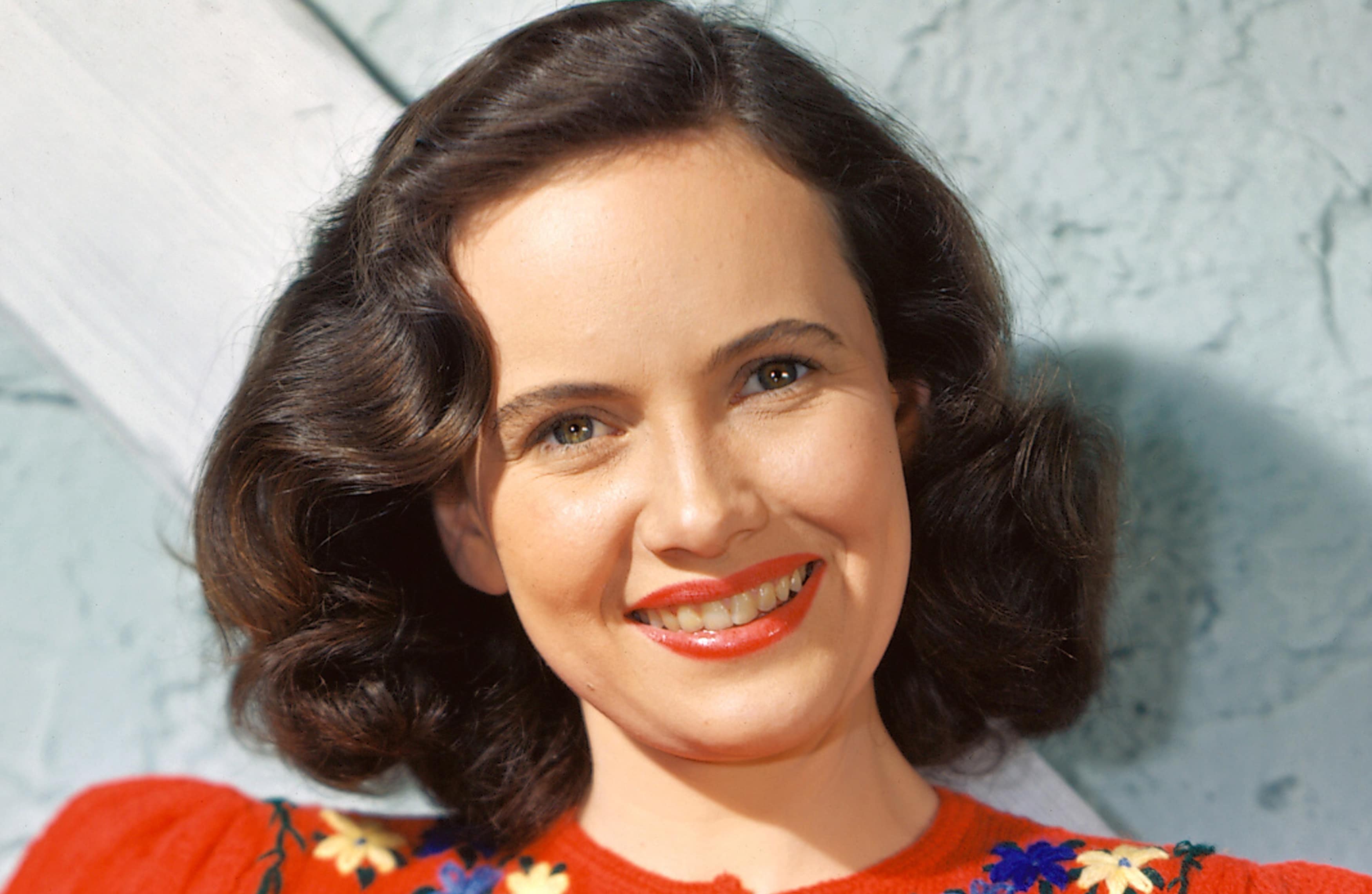Teresa Wright

About
Biography
Filmography
Family & Companions
Notes
Teresa Wright was the second actress to receive dual Academy Award moninations in the Best Actress and Best Supporting Actress category in 1942. The first was Fay Bainter in 1938.
"Really, the response to ['The Rainmaker'] has been so lovely that it makes me think that people are in need of something they can respond to emotionally, but not feel they had to live through a hurricane or something to have that feeling ... "Francis [Coppola] likes to have a lot of rehearsal to get people relating to each other, which is so unusual these days. My first two films I worked with Willie Wyler and then with Hitchcock ['Shadow of a Doubt'] and they rehearsed a lot, and the difference from others that did not rehearse as much is quite obvious to me ... "I get an awful lot of scripts for television stuff and after you've played one woman in an old-age home you don't want to do another. There's no depth to those roles. It's not very rewarding." --Teresa Wright quoted in Los Angeles Times, December 28, 1997.
Biography
Sweet and sensitive Teresa Wright made her Broadway debut as an understudy in Thornton Wilder's "Our Town" and, after touring in that play, attracted the attention of Samuel Goldwyn while playing the ingenue in the original Broadway production of "Life with Father." She made a sensational transition to screen acting, earning a Best Supporting Actress Academy Award nomination for her film debut as the seemingly fragile Southern belle Alexandra Giddens who more than holds her own with her scheming mother Regina (Bette Davis) in William Wyler's "The Little Foxes" (1941), based on the Lillian Hellman play. Wright avoided the sophomore slump with Oscar nominations for her next two movies, winning as Best Supporting Actress for her portrayal of Greer Garson's daughter-in-law in Wyler's "Mrs. Miniver" while falling short in the Best Actress category as the wife of Lou Gehrig (Gary Cooper) in "Pride of the Yankees" (both 1942). Despite her formidable talent, she was just a little too plain to really flourish as a Hollywood starlet, though she beautifully captured the small-town adolescent who gradually comes to discover her beloved Uncle Charlie is a murderer in Alfred Hitchcock's "A Shadow of a Doubt" (1943) and reteamed with Wyler as the daughter of a returning veteran in the Oscar-winning "The Best Years of Our Lives" (1946), her radiant smile lighting up the final scene with the seeming promise of good times ahead with Dana Andrews.
Wright starred opposite a debuting Marlon Brando in Fred Zinnemann's "The Men" (1950), her part and the picture recalling "The Best Years of Our Lives," but many of her subsequent roles were routine, her lack of glamour pushing her prematurely into matronly parts (e.g., as Jean Simmons' mother in George Cukor's "The Actress" 1953 at the age of 34). She retired from film in 1959 but continued acting for the small screen, picking up Emmy nominations as teacher Annie Sullivan in "The Miracle Worker" (CBS, 1957) and in the title role as the famed photographer in "The Margaret Bourke-White Story" (NBC, 1960). Wright made guest appearances on many series throughout the 60s (i.e., "Bonanza," "The Defenders," "The Alfred Hitchcock Hour") and, despite a return to features in 1969, has continued to act more frequently for TV than the big screen. Another Emmy nomination came her way for her guest spot on CBS' short-lived "Dolphin Cove" (1989), and she also turned up on two popular CBS series, "Murder, She Wrote" (in 1988) and "Picket Fences" (in 1996).
After more than a decade's absence from the stage, Wright returned first to regional theater in the early 50s in such vehicles as "The Country Wife" (Vancouver), "Bell, Book, and Candle" (Phoenix), "The Heiress" (Palm Springs) and "The Rainmaker" (La Jolla) before treading the Broadway boards again in William Inge's "Dark at the Top of the Stairs" (1957). She was back on the Great White Way in "I Never Sang for My Father" (1968), written by then-husband Robert Anderson, and in 1975 appeared in two Broadway revivals, Arthur Miller's "Death of a Salesman," as Linda Loman to George C Scott's Willy and Eugene O'Neill's "Ah, Wilderness!" as the stern aunt Lily. In the 80s, she triumphed once again as one of the sisters in the acclaimed revival of "Morning's at Seven" (1980-81) sharing a special Drama Desk Award with the ensemble that included Maureen O'Sullivan, Nancy Marchand and Gary Merrill.
During the same period, Wright appeared in occasional features. She was touching as the widow who comes alive on the dance floor in "Roseland" (1977) and was the contemporary secretary to an old actress in the cult romance "Somewhere in Time" (1980). In 1988. she and Ralph Bellamy lent their considerable talents to the roles of Diane Keaton's concerned grandparents taking sides in a custody battle in "The Good Mother." After nearly a decade away from the big screen, she delivered a fine turn as the flighty old landlady Miss Birdie in "John Grisham's 'The Rainmaker'" (1997), adapted and directed by Francis Ford Coppola, showing herself off as a fine senior citizen in the tradition of the late Lillian Gish, with whom Wright acted on Broadway in "I Never Sang for My Father."
Filmography
Cast (Feature Film)
Cast (Special)
Cast (TV Mini-Series)
Life Events
1937
Served as an apprentice at the Wharf Theater in Provincetown, Massachusetts
1938
Broadway debut as understudy in Thornton Wilder's "Our Town"
1941
Recieved Best Supporting Actress Oscar nomination for her film debut as the seemingly fragile daughter Alexandra in "The Little Foxes"; first of four films directed by William Wyler
1942
Appeared as the daughter-in-law to Greer Garson's "Mrs. Miniver", directed by Wyler; won Best Supporting Actress Academy Award
1942
Portrayed Elanor Gehrig opposite Gary Cooper's Lou Gehrig in "Pride of the Yankees"; received Oscar nomination as Best Actress
1943
Played Jospeh Cotten's namesake niece Charlie in Alfred Hitchcok's "Shadow of a Doubt", co-written by Thornton Wilder
1946
Played the daughter of Fredric March and Myrna Loy in Wyler's Oscar-winning Best Picture, "The Best Years of Our Lives"
1950
Proposed to and married a paraplegic Marlon Brando in Fred Zinnemann's "The Men"
1953
At age 34, moved into character roles, playing mother to 24-year-old Jean Simmons in "The Actress", directed by George Cukor
1953
Portrayed the mother in George Cukor's "The Actress", even though her 34 years were a mere 10 more than daughter Jean Simmons
1957
Returned on Broadway as Pat Hingle's wife in "The Dark at the Top of the Stairs"
1957
Received Emmy nomination as Best Actress in a Single Performance for her performance as teacher Annie Sullivan in "The Miracle Worker"; premiere of William Gibson's work aired on CBS' "Playhouse 90"
1959
"Retired" from films following her work in "The Restless Years"
1960
Delivered an Emmy-nominated performance as the title character of "The Margaret Bourke-White Story" (NBC's "Breck Sunday Showcase")
1962
Toured US cities in the stage production "Mary, Mary"
1968
Portrayed Alice, one of the grown children, in the Broadway production of "I Never Sang for My Father", written by then-husband Robert Anderson; cast included Lillian Gish and Hal Holbrook
1969
Returned to feature films as a character actress, performing in "Hail, Hero!" and "The Happy Ending"; in the latter, once again playing Jean Simmons' mother
1975
On Broadway, played wife Linda opposite George C Scott's Willy Loman in revival of Arthur Miller's "Death of a Salesman" (directed by Scott) and also appeared with Geraldine Fitzgerald in a revival of Eugene O'Neill's "Ah, Wilderness!"
1975
On Broadway, played wife Linda opposite George C. Scott's Willy Loman in revival of Arthur Miller's "Death of a Salesman", directed by Scott; also appeared with Geraldine Fitzgerald in a revival of Eugene O'Neill's "Ah, Wilderness!"
1977
Starred in one segment of James Ivory's tryptich "Roseland"
1980
Returned to Broadway in revival of "Morning's at Seven"; cast included Nancy Marchand, Elizabeth Wilson, Maureen O'Sullivan and Gary Merrill
1980
Appeared as the secretary to an elderly actress in the cult romance "Somewhere in Time"
1986
Appeared in two episodes of short-lived CBS series "Morningstar/Eveningstar"
1988
Played Diane Keaton's grandmother in "The Good Mother"
1990
Acted in "Pery Mason: The Case of the Desperate Deception" (NBC)
1996
Appeared in "My Romance" episode of "Picket Fences" (CBS)
1996
Appeared in "My Romance" episode of "Picket Fences" (CBS), playing long-lost love of Ray Walston's Judge Bone
1997
First feature role in almost a decade, the flighty old landlady Miss Birdie in "John Grisham's 'The Rainmaker'", directed by Francis Ford Coppola
Photo Collections
Videos
Movie Clip












Trailer









Family
Companions

Bibliography
Notes
Teresa Wright was the second actress to receive dual Academy Award moninations in the Best Actress and Best Supporting Actress category in 1942. The first was Fay Bainter in 1938.
"Really, the response to ['The Rainmaker'] has been so lovely that it makes me think that people are in need of something they can respond to emotionally, but not feel they had to live through a hurricane or something to have that feeling ... "Francis [Coppola] likes to have a lot of rehearsal to get people relating to each other, which is so unusual these days. My first two films I worked with Willie Wyler and then with Hitchcock ['Shadow of a Doubt'] and they rehearsed a lot, and the difference from others that did not rehearse as much is quite obvious to me ... "I get an awful lot of scripts for television stuff and after you've played one woman in an old-age home you don't want to do another. There's no depth to those roles. It's not very rewarding." --Teresa Wright quoted in Los Angeles Times, December 28, 1997.
Inducted into the Theater Hall of Fame in 1999.











